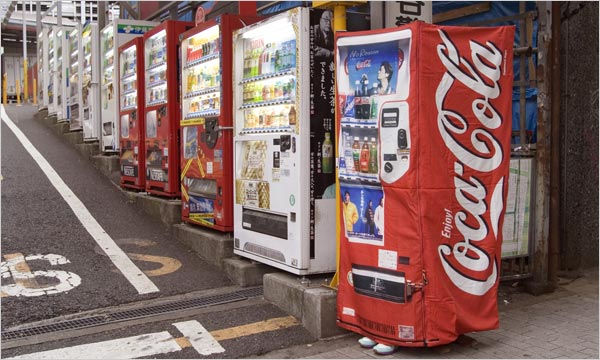Sometimes it’s fun to notice the little differences between Japan and the U.S., like the way packaging of products is much sturdier here, with two or three layers between you and that Kit Kat bar and drinks in steel cans thick enough to stop bullets. Another difference I came across recently involved the preparation and consumption of sandwiches. Last night I decided to make grilled cheese for dinner, something I don’t usually do since the only sliced cheese available here is a bland-tasting Mozzarella called “melty cheese.” I asked my wife and daughter how they’d like their sandwiches cut, launching into a slightly obsessive explanation of the many ways to approach the cutting of bread, and how I personally preferred a single diagonal cut from corner to corner, or in the case of grilled cheese cut into four triangles so you can see the melted cheese as it slowly cools. My family stared at me with blank expressions, though, and it dawned on me that the Japanese, who eat rice far more often than bread, have less “sandwich culture” than us. That’s not to say sandwiches don’t exist at all here — popular varieties include ham, egg salad, whipped cream and strawberry, cucumber and mayonnaise, and one of my favorites, Katsu-Sand, or a fried pork cutlet with that heavenly sauce called “sauce” on it inside bread. In keeping with the Japanese traditional of ensuring that all females are constipated all the time, sandwiches are usually served with the crusts completely cut off (to avoid roughage).
If you checked the Internet over the weekend, you may have caught one of the dozen or so blogs that linked to a wacky image of a person dressed as a Coca-Cola vending machine, from a piece last week in the New York Times. The article stated with a straight face that fear of being assaulted while walking down the street was causing Japanese females to disguise themselves as vending machines to feel safe, which immediately compelled me to check my calendar to see that I hadn’t somehow time-slipped to April 1st. For the record, the Times reporter got this one wrong, taking a parody creation intended as social commentary for a product people would actually use. It is, of course, easy to get the wrong idea about Japan, a country that seems at times to be specially created to perplex Westerners. I remember as a child hearing about the paper walls in Japan and wondering how they kept rain and wind out — but of course, shoji doors are only used inside, and there are sturdy walls of wood and concrete between you and the elements. Before I came to Japan, I got some advice from an older gentleman in a barber shop to “Stay away from those geisha! They’ll get ya!” I’ve yet to find anything resembling real geisha in modern Japan, although I drank beer with a Shinto shrine maiden once. And those weird Japanese inventions you may have seen, like tiny umbrellas for your shoes or a small electric fan you attach to your chopsticks to cool your noodles as you eat them? They’re a long-running gag called “chindougu,” or “useless Japanese inventions” and they don’t exist, although we always get a few requests for them at J-List.

For the record, Japan is statistically quite a safe country when it comes to crime, and visitors here probably have nothing to fear (as long as you watch out for those geisha). Murders are so rare in Japan that when one occurs, it’s often discussed for days, and the idea of a murder not being reported in the news because it was “too normal” is unheard of. Japan has been rumored to be a country so honest that you could forget an expensive camera on a park bench and go back for it the next day to find it still there, and this has proven to be true for me on several occasions — also, a gaijin friend of mine managed to lose his wallet in three different parts of Japan yet it was returned to him through the police all three times. It doesn’t always work that way of course — I once managed to have an expensive Zero Haliburton case taken off a train in “safe” Japan, then a week later in the U.S. my wife lost her purse with $800 in cash inside (silly Japanese females, will they never learn?), yet it was returned to her with all the cash inside. If you’re planning a trip to Japan, you should have nothing to fear as long as you take certain precautions. Avoid bringing too much cash, of course, and keep valuables close to you, and if a place looks seedy and dangerous, it may well be — use common sense and try to go with a local friend as a guide if possible.
J-List specializes in Japan’s excellent PC dating-sim games, which feature intricate stories and beautiful anime-style characters you can interact with in many ways. One of our favorite titles is also one of the most unique: Casual Romance Club, a game that was released in English and the only game in which the girls will chat with you in beautiful (Japanese accented) English as an option. It’s one of the most realistic “dating-sim” games ever conceived of, since that’s what you do, interact with the girls in the “dating club” and find out what makes each girl tick, then ask them out for a date — but watch out, since the girls can be quite jealous of each other, just like in real life. For a limited time, you can get this game sent to you with free shipping, quite a savings since it ships from Japan in a large heavy box with the most beautiful computer manual you’ll ever see in a PC game.
Remember that J-List carries tons of wacky Japanese T-shirts, with designers that use the aesthetic beauty of kanji to create a great original look for you. Whether you’re looking for wacky messages like “Support the Emperor and Expel the Foreign Barbarians” (a popular 19th century political slogan), subtle messages like “Warning: Rated H” or are more interested in shirts with cultural appeal, we’ve got plenty of designs for you, with both standard men’s shirts as well as stylish fitted T-shirts for girls from American Apparel. Also, now that it’s starting to get cooler, we humbly suggest you check out our line of extremely warm hoodies, which are made using the best quality 80/20 cotton blends available for years of softness.















